Mercury Over Maps is an extended residency by Bill Thompson at Hundred Years Gallery featuring performances, installations and talks with various collaborators and guest artists.
The evening will feature a solo by Nicolas Collins (live electronics), a duet between Jennifer Allum (violin) and David Toop (lapsteel, flute, recorder), and a duet between Phil Durrant (modular synthesizer) and Bill Thompson (Moog guitar and objects).
Doors 7:30 | music from 8pm | entry £5
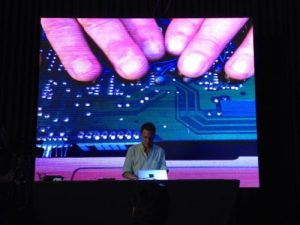
New York born and raised, Nicolas Collins studied composition with Alvin Lucier at Wesleyan University, worked for many years with David Tudor, and was an active participant in the New York improvised music scene in the 1980s. He spent most of the 1990s in Europe, where he was Visiting Artistic Director of Stichting STEIM (Amsterdam), and a DAAD Composer-in-Residence in Berlin. From 1997 – 2017 he was Editor-in-Chief of the Leonardo Music Journal. Since 1999 has been a Professor in the Department of Sound at the School of the Art Institute of Chicago, and since 2016 a Research Fellow at the Orpheus Instituut (Ghent).
Collins’ music is rooted in the homemade circuitry movement that developed in the USA in the early 1970s under the influence of pioneering composer/luthiers such as David Tudor, David Behrman, and Gordon Mumma. His book, Handmade Electronic Music – The Art of Hardware Hacking (Routledge 2006), helped launch the “post- digital” DIY circuit movement, and has influenced emerging electronic music worldwide. Collins is also an early adopter of microcomputers for live performance, alternative musical controllers, interactive work for conventional acoustic instruments and electronics, and live video scoring.
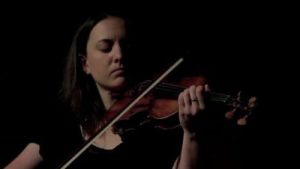 Jennifer Allum is a violinist specialising in experimental and improvised music. Classically trained, she studied music at York University and Goldsmiths College. She has been resident in London for more than 10 years, though grew up in the Middle East. She is a regular performer across the UK and in Europe, at venues like Cafe Oto, Ausland, and the Huddersfield Contemporary Music Festival. Improvisation collaborations include those with David Toop, The Seen, Eddie Prevost, Ute Kanngiesser, Dimitra Lazaridou-Chatzigoga, Clive Bell and Marjolaine Charbin. Jennifer’s playing has been described as “resolutely free of flourish and standard violinistic mannerism, inhabiting instead a soundworld that is austere, mesmerising, and speckled with glimpses of latent violence.” Her recordings are available from Matchless Recordings and Trestle Records, with a forthcoming release on Confront Recordings.
Jennifer Allum is a violinist specialising in experimental and improvised music. Classically trained, she studied music at York University and Goldsmiths College. She has been resident in London for more than 10 years, though grew up in the Middle East. She is a regular performer across the UK and in Europe, at venues like Cafe Oto, Ausland, and the Huddersfield Contemporary Music Festival. Improvisation collaborations include those with David Toop, The Seen, Eddie Prevost, Ute Kanngiesser, Dimitra Lazaridou-Chatzigoga, Clive Bell and Marjolaine Charbin. Jennifer’s playing has been described as “resolutely free of flourish and standard violinistic mannerism, inhabiting instead a soundworld that is austere, mesmerising, and speckled with glimpses of latent violence.” Her recordings are available from Matchless Recordings and Trestle Records, with a forthcoming release on Confront Recordings.
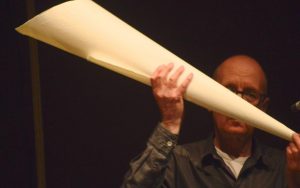 David Toop (born 1949) has been developing a practice that crosses boundaries of sound, listening, music and materials since 1970. This encompasses improvised music performance, writing, electronic sound, field recording, exhibition curating, sound art installations and opera. It includes seven acclaimed books, including Rap Attack(1984), Ocean of Sound (1995), Sinister Resonance (2010) and Into the Maelstrom(2016), the latter a Guardian music book of the year, shortlisted for the Penderyn Music Book Prize.
David Toop (born 1949) has been developing a practice that crosses boundaries of sound, listening, music and materials since 1970. This encompasses improvised music performance, writing, electronic sound, field recording, exhibition curating, sound art installations and opera. It includes seven acclaimed books, including Rap Attack(1984), Ocean of Sound (1995), Sinister Resonance (2010) and Into the Maelstrom(2016), the latter a Guardian music book of the year, shortlisted for the Penderyn Music Book Prize.
Briefly a member of David Cunningham’s pop project The Flying Lizards in 1979, he has released thirteen solo albums, from New and Rediscovered Musical Instruments on Brian Eno’s Obscure label (1975) and Sound Body on David Sylvian’s Samadhisound label (2006) to Entities Inertias Faint Beings (2016). His 1978 Amazonas recordings of Yanomami shamanism and ritual were released on Sub Rosa as Lost Shadows (2016). In recent years his collaborations include Rie Nakajima, Akio Suzuki, Tania Chen, John Butcher, Ken Ikeda, Elaine Mitchener, Henry Grimes, Sharon Gal, Camille Norment, Sidsel Endresen, Alasdair Roberts, Thurston Moore and a revived Alterations, the iconoclastic improvising quartet with Steve Beresford, Peter Cusack and Terry Day first formed in 1977. His opera – Star-shaped Biscuit – was performed as an Aldeburgh Faster Than Sound project in 2012.
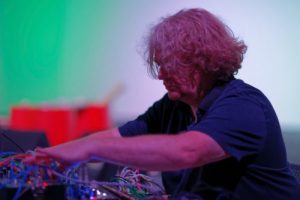
Born near London in 1957, Phil Durrant is an improviser/composer/sound artist who has devised his own virtual performance instruments using Reaktor. Recently, he has been performing solo, duo (with Phil Maguire) and trio concerts (with Mark Wastell and Richard Sanderson), using an analogue/digital modular synthesizer system.
As a violinist (and member of the Butcher/Russell/Durrant trio), he was one of the key exponents of the ‘group voice approach’ style of improvised music. In the late 90s, his trio with Radu Malfatti and Thomas Lehn represented a shift to a more “reductionist” approach.
Durrant’s exploration in the use of live electronics to expand the timbre of the violin, evolved into the creation and building of self-made virtual instruments. His live sampling/treatments duo with John Butcher and his work MIMEO, saw Durrant move from the use of hardware to the use of software in live situations. He has always been keen to transfer the flexibility of playing an acoustic instrument, into his laptop performances.
Durrant also performs regularly with the acoustic/electronic group Trio Sowari (with Bertrand Denzler and Burkhard Beins). In addition, he is an Associate Lecturer at Southampton Solent University. He has also collaborated and composed site-specific music for a wide variety of choreographers, including Maxine Doyle, Susanne Thomas, and Gill Clarke.
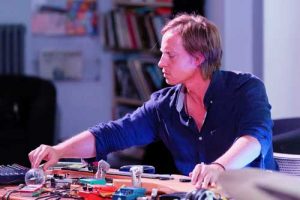 Bill Thompson is a sound artist and composer. He performs as a soloist and with a number of groups including M/H/T with Jan Hendrickse and Tom Mudd, Airfield with choreographer Ian Spink, and in the past with Keith Rowe, Faust, EXAUDI and others.
Bill Thompson is a sound artist and composer. He performs as a soloist and with a number of groups including M/H/T with Jan Hendrickse and Tom Mudd, Airfield with choreographer Ian Spink, and in the past with Keith Rowe, Faust, EXAUDI and others.
Although originally trained as a guitarist, Thompson has worked with live electronics for the better part of 15 years. Since 2016/17, however, he has returned to guitar using one built by Moog combining built in electronics with miscellaneous table top devices, found objects, flashing lights, and the occasional vibrator.
He has earned numerous awards and commissions including the PRS for New Music ATOM award, the GAVAA visual arts award, a PRS for New Music Three Festival commission, the 2010 Aberdeen Visual Arts Award, and was nominated for the Paul Hamlyn Award in 2012.

